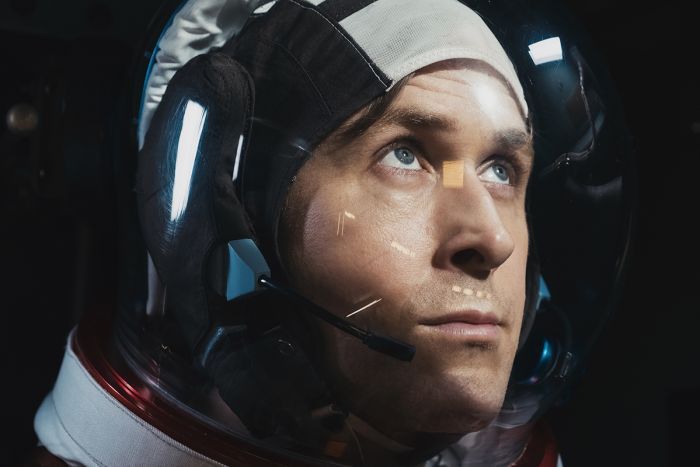How far would you travel to get away from everyone you love? Would 400,000 kilometres be enough?
Damien Chazelle is not a romantic. He is in the habit of taking conventionally uplifting genres — the artist’s journey, the technicolour musical, and now the space race — cutting out their rah-rah hearts, and rebuilding them with a controlled focus on grit, sacrifice and the weight of roads not taken.
The spectacular lunar leap that took place in the summer of 1969 is hardwired to be a narrative of triumph. Triumph over gravity, over the odds, and, let’s not forget, over the Soviets, who snatched an early victory with Alexei Leonov’s 1965 space walk. But there is little air-punching indulgence in First Man, Chazelle’s strange, surprising biopic of Neil Armstrong, which mixes the tight rhythm of Whiplash with the ambient emotional ambiguities of art-house science fiction.
This is a film about distances; ones that can be traversed and ones that cannot. Ryan Gosling takes his trademark inscrutability to new heights as the repressed, withdrawn but committed Armstrong, who, after losing his infant daughter to cancer, joins NASA’s Gemini programme, the training ground for the Apollo missions that would follow.
Armstrong is an anti-hero alienated from everyone around him; domestic scenes with wife Janet (Claire Foy, having a difficult time both intentional and otherwise) frame him on the other side of doorways, or cordoned off in other rooms. He places himself in separation and seclusion, standing in the back yard, viewfinder turned on the shining object of NASA’s obsession. He is the latest in Chazelle’s line of dreamers — he dreams not of discovery, but of withdrawal, of escape.
Armstrong is alienated from himself, internal life all gnarled like a sailor’s knot, a subtle performance that asks for a subtle kind of sympathy. The death of his child has a fallout that cascades through the rest of the narrative, just under the surface, reframing the voyage to the Moon as history’s most daring act of emotional avoidance. When the inaugural astronaut finally disturbs the moon dust, an invocation of his daughter’s memory turns the historical and political achievement into a moment of lonely, private solace, a minor catharsis that offers no real transformation. Josh Singer ends his screenplay with one of the most devastating anti-climaxes of a modern blockbluster.
But we’re getting ahead of ourselves; there’s a lot of work before they get there. In the wake of Kennedy throwing down the gauntlet, NASA’s going to have to move quicker than they ever have, throwing their trainees — including Jason Clarke, and Corey Stoll as the assholish “Buzz” Aldrin — through the ringer. “The Soviets are going to have to start from scratch”, says Kyle Chandler’s instructor, while tracing a to-scale chalk diagram on a blackboard, “and so are we”, which is such a perfectly Kyle Chandler thing to do and say.
The cockpits are claustrophobic analogue dens, maybe the only place Armstrong feels comfortable. Chazelle shoots excursions past the atmosphere from the inside-out, emphasizing the physical strain, quick thinking and guesswork required. In moments of crisis, Armstrong playing the fobs and switches like a kind of music. There are, mercifully, chances to catch our breath, with shifts to majestic exteriors and wider lens sizes that rush the screen with new kinds of emptiness.
There is wonder in the film, but it is wonder that comes at the tail end of a process of pain and purification. The deaths of Apollo 1’s crew, when a burst of flame floods their Command module, is a moment of sudden, understated terror. By the time 1969 rolls around, the grasping glory has faded, replaced with fatalistic, teeth-gritted resolve.
Like you’ve probably read, there are no stars and stripes. But by that point, they wouldn’t mean much anyway. Conor Smyth
First Man is out on wide release.






